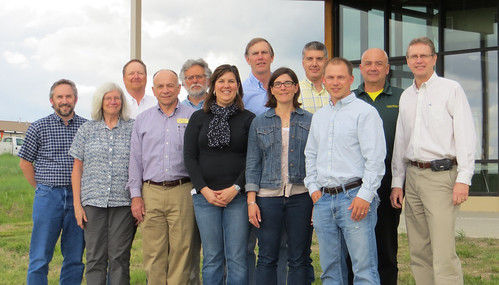
All this month we will be taking a look at what a changing climate means to Agriculture. The ten regional USDA Climate Hubs were established to synthesize and translate climate science and research into easily understood products and tools that land managers can use to make climate-informed decisions. The Hubs work at the regional level with an extensive network of trusted USDA agency partners, technical service providers, University collaborators, and private sector advisers to ensure they have the information they need to respond to producers that are dealing with the effects of a variable climate. USDA's Climate Hubs are part of our broad commitment to developing the next generation of climate solutions, so that our agricultural leaders have the modern technologies and tools they need to adapt and succeed in the face of a changing climate.
The USDA Northern Plains Regional Climate Hub (NPRCH) partnered with the 1914 Cooperative Extension programs in Montana, Wyoming, Colorado, North and South Dakota, and Nebraska to develop and deliver science-based, region specific information and technologies to agricultural and natural resource managers to enable them to make climate-informed decisions. The team has met monthly since June 2015, and through their efforts and partnership with the NPRCH they reached out to Extension colleagues to develop relevant projects that meet stakeholder needs in the region.
Since becoming partners, the NPRCH Extension and Outreach participants have developed the following three efforts, which they will work on during the coming year.
North Dakota State University (NDSU) Extension will lead an effort titled Extension Climate Curriculum, A Primer for Weather Extremes in the Northern Great Plains with Montana State University (MSU) Extension. The team will create an interactive iBooks-based weather curriculum to be delivered by Extension professionals. The project goals include:
- Engage Extension professionals in climate issues
- Create an iBook curriculum focusing on basic weather terminology and weather extremes
- Provide training for Extension professionals in the use of the curriculum
The Extension Climate Curriculum team anticipates raising the awareness and improving peoples’ knowledge of and use of weather terms, and concepts to create a common language.
The University of Nebraska Lincoln (UNL) Extension will lead an effort titled Scenario Planning for Resilient Beef Systems with South Dakota State University (SDSU) Extension. The team will facilitate scenario planning with beef system stakeholders to leverage use of regional climate data, discover robust management options, and prioritize Extension programming, creating more resilient beef systems in the region. The project goals include:
- Determine a suite of key, plausible future scenario based on climate science, divergent, relevant, and challenging to the beef industry
- Develop white papers summarizing climate impacts to Northern Plains beef systems
The Scenario Planning for Resilient Beef Systems team anticipates Extension professionals in the region will be better prepared to engage beef system stakeholders to address climate challenges, and stakeholders will be more engaged in addressing climate challenges.
The University of Wyoming (UW) Extension will lead an effort titled Adapting Agriculture to Weather and Extreme Events by Connecting Agricultural Producers to Early Adopters with SDSU, Colorado State University Water Institute, and NDSU. The team will use multi-media to highlight agricultural producers who are early adopters of adaptation strategies, which build resiliency of operations to weather and extreme events. The project goals include:
- Identify and film agricultural producers who are early adopters of adaptation strategies
- Develop an interactive webpage highlighting videos
- Create interactive fact sheets featuring adaptation strategies
- Write popular press articles highlighting the early adopters
The Adapting Agriculture to Weather and Extreme Events team anticipates an increase in knowledge of agricultural producers and Extension professionals about different adaptation strategies.
The NPRCH thanks our Extension and Outreach partners. We are excited to continue working with the Extension and Outreach team throughout the Northern Plains to develop and deliver science-based, region specific information and technologies to agricultural and natural resource managers to enable them to make climate-informed decisions.
